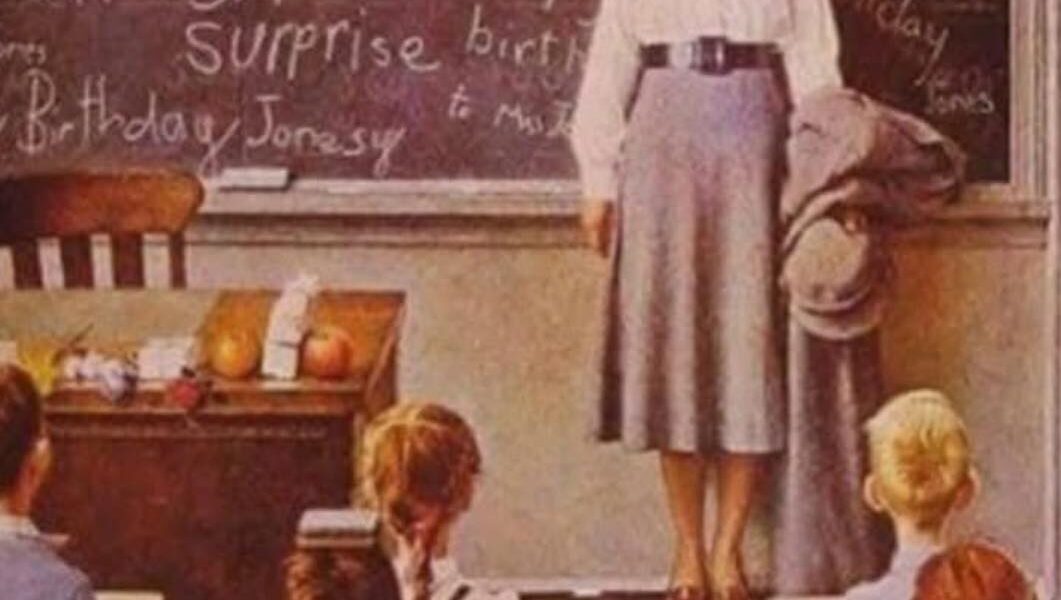On the first day of the new school year, Mrs. Thompson stood before her 5th-grade class and, like so many teachers do, looked at her students and said the words she had said every year:
“I love you all the same.”
But it wasn’t true. And she knew it.

Because slouched in the front row was a little boy named Teddy Stoddard — unkempt hair, wrinkled clothes, distant eyes. Mrs. Thompson had noticed Teddy the year before: he didn’t talk much, didn’t play well with the others, and often looked like he hadn’t bathed. His papers were a mess, his behavior difficult, his presence forgettable — or worse, inconvenient.
And as much as she wouldn’t admit it out loud, Mrs. Thompson took a strange satisfaction in marking big red X’s across Teddy’s work and putting bold F’s at the top. It was easier to dismiss him than to understand him.
Until one day, that changed.
Each teacher at her school was required to review their students’ previous records. Mrs. Thompson saved Teddy’s file for last — almost as if she didn’t want to be reminded of him more than she had to.
But when she opened it, her heart sank.
First Grade:
“Teddy is a bright, sweet child with a ready laugh. He does his work neatly and is a joy to have in class.”
Second Grade:
“Teddy is an excellent student, but his mother is very ill. Life at home is clearly hard for him.”
Third Grade:
“Teddy is trying, but his mother’s recent death has taken a toll. His father shows little interest, and Teddy is starting to fall behind.”
Fourth Grade:
“Teddy is withdrawn, depressed, and shows little motivation. He often sleeps in class.”
Mrs. Thompson sat at her desk for a long time, stunned. The weight of her own judgment hit her like a punch to the chest.
And when Christmas came, her shame only deepened.
Her students brought gifts wrapped in bright ribbons and shiny paper. But Teddy’s was different — wrapped in crumpled brown grocery bag paper, taped clumsily. Inside was a rhinestone bracelet, missing stones, and a quarter-full bottle of perfume.
Some of the students laughed.
But Mrs. Thompson silenced them with a warm smile. She put the bracelet on, dabbed a bit of the perfume on her wrist, and said, “Isn’t this lovely?”
Teddy stayed after class that day. He didn’t say much. Just one sentence:
“Mrs. Thompson… today you smelled just like my mom used to.”

When he left, she sat at her desk and cried for a long time.
That day, something shifted.
She stopped teaching lessons and started reaching hearts.
She worked with Teddy closely, encouraged him, praised his efforts, and slowly, something remarkable happened. His mind came alive. His grades improved. His joy returned. By the end of the year, Teddy had become one of the brightest students in the class.
And though she had once said she loved them all the same, it was clear Teddy had carved out a special place in her heart.
Years passed.
One day, a note arrived from Teddy:
“Thank you, Mrs. Thompson. You’re still the best teacher I ever had.”
Six years later, another letter:
“I just graduated high school, third in my class. You’re still the best.”
Four more years:
“Things were tough, but I stayed in school. I’m about to graduate college with honors. Thank you for believing in me.”
Then another:
“I’ve gone further. I’m now Theodore F. Stoddard, M.D.”
And finally, one more envelope — a wedding invitation. Teddy asked if she would sit in the place of honor, reserved for the mother of the groom.
Mrs. Thompson accepted.
She wore the rhinestone bracelet. She wore the perfume.
And as they embraced after the ceremony, Dr. Stoddard whispered,
“Thank you for making me feel like I mattered.”
With tears in her eyes, she replied,
“No, Teddy. You were the one who taught me that I could make a difference. I didn’t know how to teach — until I met you.”
The lesson?
Everyone is carrying a story we can’t see.
Judgment is easy. Compassion takes work.
But sometimes, believing in someone — even just once — can change the course of their life.
And, just maybe, yours too.
So, love boldly. Teach gently. And never underestimate the power of showing someone they matter.



